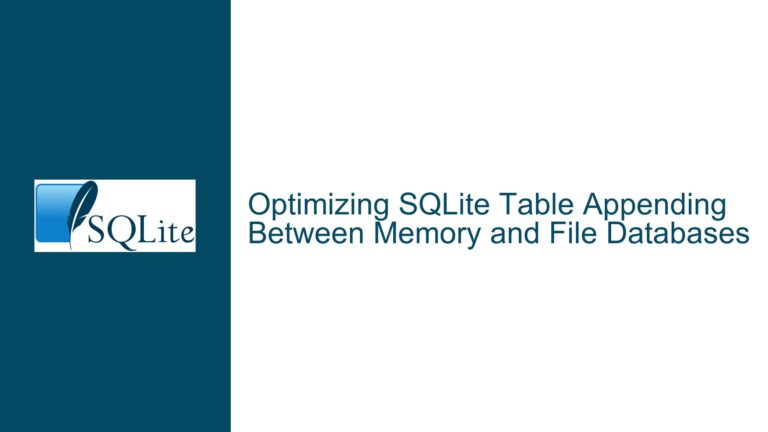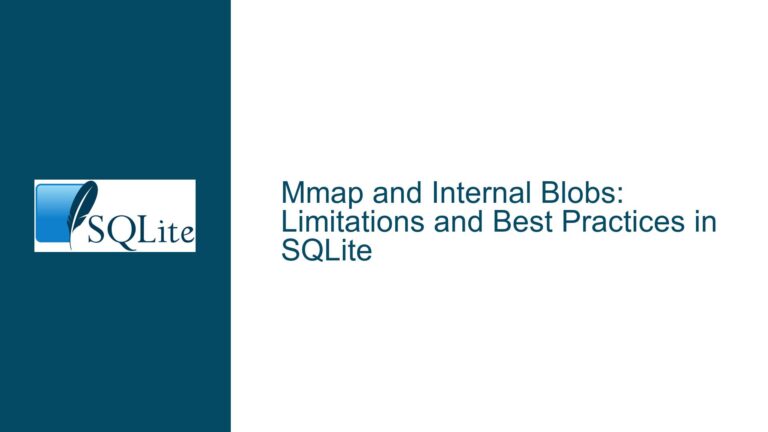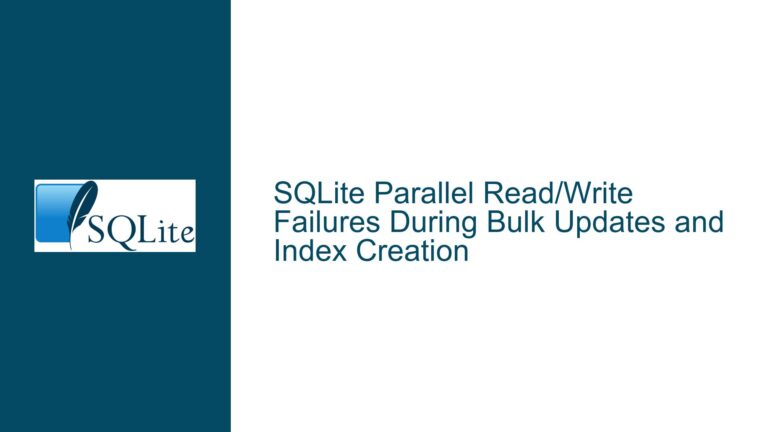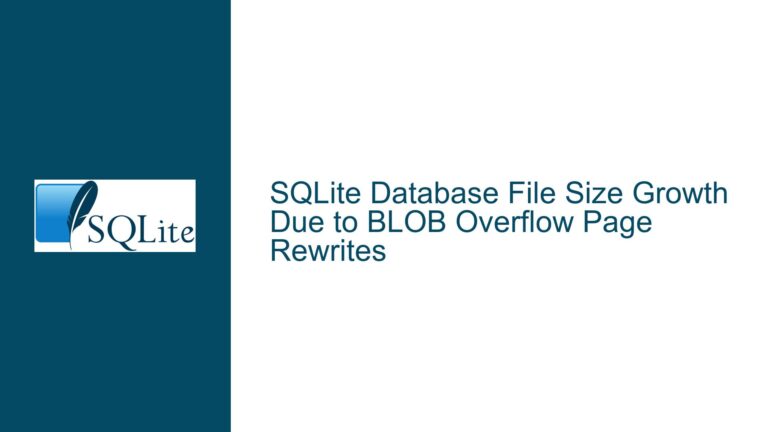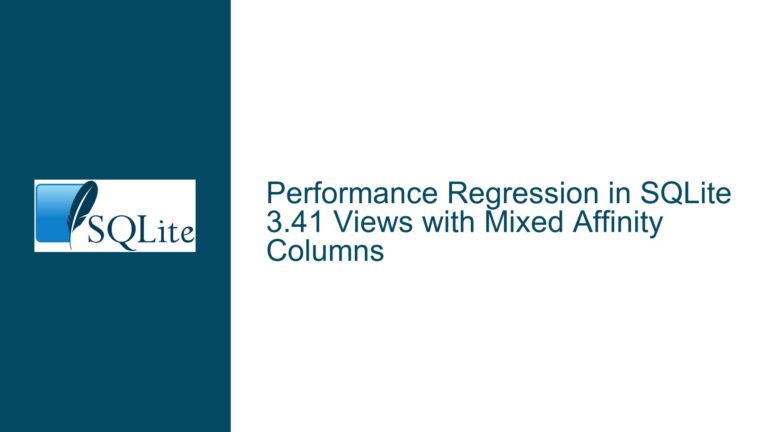SQLite CTE Query Performance Regression: 3.46.1 to 3.47.2 Analysis
Significant Query Performance Degradation in SQLite Version Migration
SQLite applications utilizing Complex Common Table Expressions (CTEs) have encountered a notable performance regression when upgrading from version 3.46.1 to 3.47.2. The severity of this regression manifests as an order-of-magnitude slowdown, with query execution times increasing from approximately 1.5 seconds to 17 seconds on large-scale databases (~7GB). This performance degradation particularly impacts applications dealing with complex data relationships and multi-layered CTEs, potentially affecting system responsiveness and user experience.
The regression’s impact becomes especially pronounced when working with debug builds, where the performance differential can extend up to 30x slower execution times with -DSQLITE_DEBUG compilation flags. This dramatic variance between debug and release builds suggests underlying complexities in query optimization and execution path selection that warrant careful consideration during development and deployment phases.
The issue’s scope extends beyond simple query execution, touching on fundamental aspects of SQLite’s query planner behavior and optimization strategies. While the regression has been identified and addressed in recent trunk commits, understanding its root causes and available workarounds remains crucial for database administrators and developers managing production systems with similar query patterns.
Query Planner Optimization Shifts and Debug Build Implications
The core of the performance regression stems from changes in SQLite’s query planning mechanism between versions 3.46.1 and 3.47.2. Several key factors contribute to this behavior:
Query Plan Divergence
The execution plans generated for identical CTE queries differ significantly between the two versions. This divergence in plan selection indicates fundamental changes in the query optimizer’s decision-making process, potentially related to cost estimation or optimization strategy adjustments introduced in version 3.47.2.
Debug Build Performance Impact
A particularly noteworthy aspect of the regression is the severe performance impact observed in debug builds. When compiled with -DSQLITE_DEBUG, query execution times can increase by a factor of 30 or more. This extraordinary difference between debug and release builds suggests potential interactions between debugging instrumentation and query optimization paths that weren’t present in earlier versions.
Statistics and Analysis Dependencies
The regression’s severity may be influenced by the state of table statistics and analysis data. The query planner’s effectiveness heavily depends on up-to-date statistics about table contents and index distributions. Changes in how these statistics are utilized between versions could contribute to the observed performance differences.
CTE Materialization Considerations
The introduction of explicit materialization hints for CTEs has shown promise in mitigating the performance regression. This suggests that the default materialization strategy in 3.47.2 may be suboptimal for certain query patterns, particularly those involving complex CTEs with large intermediate results.
Comprehensive Resolution Strategy and Performance Optimization Techniques
Addressing the performance regression requires a multi-faceted approach combining immediate workarounds with long-term optimization strategies:
Immediate Mitigation Strategies
The most effective immediate solution involves implementing CTE materialization hints. Adding the MATERIALIZED keyword to CTE definitions can restore performance to levels comparable with version 3.46.1. This approach provides a quick fix while waiting for permanent solutions in newer SQLite releases.
Query Analysis and Optimization
Database administrators should employ SQLite’s built-in analysis tools to optimize query performance:
-- Update table statistics
ANALYZE;
-- Enable expert mode in SQLite CLI
.expert
-- Example of CTE materialization
WITH MATERIALIZED complex_cte AS (
SELECT ...
)
Index Optimization and Statistics Management
Maintaining optimal query performance requires regular attention to index management and statistics:
-- Create recommended indexes based on .expert output
CREATE INDEX idx_name ON table_name(column_name);
-- Refresh statistics after significant data changes
ANALYZE table_name;
Long-term Resolution
The SQLite development team has addressed the core issue through several key improvements:
- A fix has been implemented in trunk commit 0852c57ee2768224, resolving the primary performance regression.
- Test cases have been added to prevent similar regressions in future releases.
- The fix addresses both debug and release build performance disparities.
Build Configuration Considerations
When working with debug builds, developers should be aware of the potential performance impact:
# Optimal production build
gcc -O2 -DNDEBUG ...
# Debug build (expect performance impact)
gcc -DSQLITE_DEBUG ...
Performance Monitoring and Testing
Implementing a robust performance monitoring strategy helps identify and address similar issues:
-- Execution plan analysis
EXPLAIN QUERY PLAN
SELECT ...;
-- Query timing measurement
.timer on
SELECT ...;
Query Decomposition and Analysis
Breaking down complex queries into smaller components can help isolate performance bottlenecks:
-- Instead of single complex query
WITH cte1 AS (
complex_subquery1
),
cte2 AS (
complex_subquery2
)
SELECT ...
-- Test components separately
WITH cte1 AS (
complex_subquery1
)
SELECT ...;
-- Then
WITH cte2 AS (
complex_subquery2
)
SELECT ...;
The resolution of this performance regression demonstrates the importance of comprehensive testing across different build configurations and the value of community feedback in identifying and addressing performance issues. Future SQLite releases will incorporate these improvements, ensuring consistent performance across debug and release builds while maintaining the database engine’s reliability and efficiency.
For systems currently affected by this regression, upgrading to the latest SQLite trunk build is recommended, as it incorporates the necessary fixes while maintaining backward compatibility. In cases where immediate upgrading isn’t feasible, implementing CTE materialization hints provides an effective temporary solution without requiring version changes.

